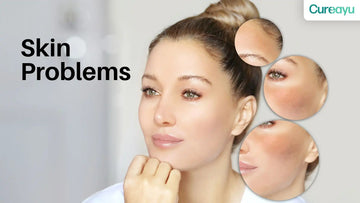Our skin is the largest organ of the body and serves as a protective barrier against environmental factors, bacteria, and pollutants. However, due to various reasons, skin problems have become increasingly common among people of all ages. These issues can range from minor irritations to chronic conditions requiring medical intervention.
Skin problems not only affect our physical appearance but also impact our confidence and overall well-being. Some conditions are temporary and can be treated with simple remedies, while others require long-term management. In this blog, we will discuss different types of skin problems, their symptoms, causes, and possible treatments.
Also Read: How to Combat Dry Skin in Winter: Causes, Symptoms, Treatments, and Remedies
What Are the Types of Skin Problems?
1. Acne
Acne is one of the most prevalent skin conditions, affecting millions worldwide. It occurs due to excess oil production, clogged pores, and bacterial infections. Acne can manifest as blackheads, whiteheads, pimples, or cystic lesions, primarily appearing on the face, chest, and back.
Common Causes:
-
Hormonal changes (puberty, pregnancy, menstrual cycles)
-
Excessive oil production
-
Stress and poor diet
-
Use of comedogenic skincare products
Symptoms:
-
Red, inflamed pimples
-
Painful cysts under the skin
-
Whiteheads and blackheads
-
Scarring in severe cases
2. Eczema (Atopic Dermatitis)
Eczema is a chronic skin condition that leads to red, dry, and itchy skin. It is often linked to genetic and environmental factors and can be triggered by allergens, irritants, or weather changes.
Common Causes:
-
Allergies (dust, pollen, pet dander)
-
Harsh skincare products
-
Stress and anxiety
-
Genetic predisposition
Symptoms:
-
Dry, flaky skin
-
Red, inflamed patches
-
Intense itching and irritation
-
Cracked or oozing skin in severe cases
3. Psoriasis
Psoriasis is an autoimmune disorder that results in the rapid buildup of skin cells, causing thick, scaly patches. It can appear on the scalp, elbows, knees, and lower back.
Common Causes:
-
Immune system dysfunction
-
Genetic factors
-
Infections and stress
-
Certain medications (e.g., beta-blockers)
Symptoms:
-
Thick, scaly patches of skin
-
Redness and inflammation
-
Itching and discomfort
-
Flaking and peeling skin
4. Rosacea
Rosacea is a chronic skin condition that primarily affects the face, leading to persistent redness, visible blood vessels, and acne-like bumps.
Common Causes:
-
Sun exposure
-
Alcohol and spicy foods
-
Stress and extreme temperatures
-
Genetic predisposition
Symptoms:
-
Redness and flushing of the face
-
Visible blood vessels
-
Acne-like bumps
-
Dry and sensitive skin
5. Melasma
Melasma causes dark patches on the face, especially on the cheeks, forehead, and upper lip. It is often triggered by hormonal fluctuations.
Common Causes:
-
Pregnancy ("pregnancy mask")
-
Excessive sun exposure
-
Hormonal changes due to birth control
-
Genetics
Symptoms:
-
Brown or grayish patches on the skin
-
Uneven skin tone
-
Worsening with sun exposure
6. Hives (Urticaria)
Hives are raised, itchy welts that appear suddenly due to allergic reactions or other triggers.
Common Causes:
-
Allergic reactions (food, medications, insect bites)
-
Infections
-
Stress and anxiety
-
Weather changes
Symptoms:
-
Itchy, red welts
-
Swelling and irritation
-
Sudden flare-ups and fading
Also Read: 6 Best Supplements for Glowing, Healthy Skin
Face Skin Problems
1. Oily Skin
Excess oil production leads to a greasy appearance, clogged pores, and acne. Proper skincare is essential to control excess sebum.
2. Dry Skin
Dry skin results in flakiness, irritation, and tightness. It is caused by harsh weather conditions, dehydration, and aging.
3. Dark Circles
Lack of sleep, poor diet, genetics, and stress contribute to dark circles, making the face look dull and tired.
4. Wrinkles and Fine Lines
Aging, sun exposure, and lack of hydration lead to premature wrinkles and fine lines.
5. Hyperpigmentation
Uneven skin tone and dark spots result from excessive sun exposure, hormonal changes, and acne scars.
Also Read: Discover the Top Anti-Aging Foods That Keep Your Skin Youthful and Radiant
Symptoms of Skin Problems
-
Redness and inflammation: Common in acne, rosacea, and eczema.
-
Itching and burning: Notable in hives, eczema, and fungal infections.
-
Flaky or scaly skin: Seen in psoriasis, dry skin, and fungal infections.
-
Breakouts and pimples: A sign of acne and hormonal imbalances.
Causes of Skin Problems
1. Hormonal Imbalance
Fluctuations in hormones, especially during puberty, pregnancy, and menopause, can lead to acne, melasma, and other skin issues.
2. Poor Diet
Consuming excessive processed foods, sugar, and dairy can trigger breakouts and dull skin.
3. Lack of Proper Skincare Routine
Failure to cleanse, exfoliate, and moisturize leads to clogged pores, dull skin, and premature aging.
4. Stress and Lack of Sleep
High stress levels and insufficient sleep contribute to breakouts, dark circles, and overall poor skin health.
5. Environmental Factors
Pollution, UV rays, and harsh weather damage the skin, leading to pigmentation and premature aging.
Also Read: Managing Wrinkles on Face: Causes, Symptoms, Treatments, and Prevention
Effective Solutions for Skin Problems
1. Follow a Proper Skincare Routine
-
Cleanse, exfoliate, and moisturize daily
-
Use sunscreen to protect against UV damage
-
Choose non-comedogenic products
2. Maintain a Healthy Diet
-
Eat a balanced diet rich in vitamins and antioxidants
-
Drink plenty of water to keep the skin hydrated
-
Reduce processed foods and sugar intake
3. Manage Stress and Sleep Well
-
Practice relaxation techniques like meditation and yoga
-
Ensure at least 7-8 hours of sleep per night
-
Reduce caffeine and screen time before bed
4. Seek Medical Treatment When Necessary
-
Consult a dermatologist for persistent skin conditions
-
Use prescribed medications for conditions like acne, psoriasis, and eczema
-
Consider laser therapy or chemical peels for hyperpigmentation
5. Avoid Skin Irritants
-
Use gentle, fragrance-free skincare products
-
Avoid excessive sun exposure
-
Wear protective clothing when outdoors
Final Words
Taking care of your skin is not just about enhancing your appearance—it’s about maintaining overall health and confidence. By understanding the causes, symptoms, and solutions for various skin problems, you can take proactive steps to achieve healthy, radiant skin.
Follow a consistent skincare routine, eat a nutritious diet, and seek professional advice when necessary. Prioritizing your skin’s health today will lead to a clear and glowing complexion for years to come!











